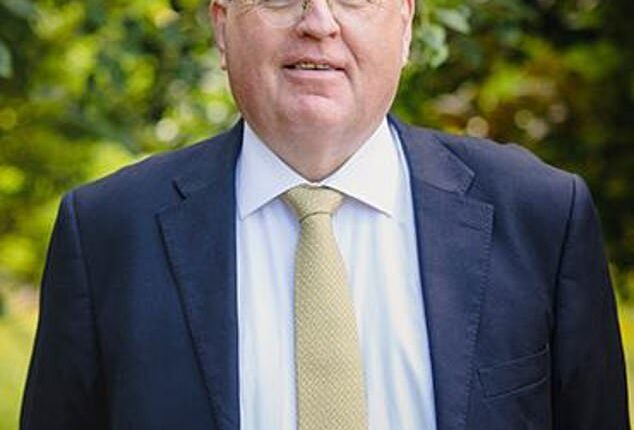There are probably only three essentials any householder seeks from their water supply – that it is clean, constant and won’t cost them a fortune.
If they ever thought about it, they might have believed that the same straightforward standards should be used for those in charge of overseeing the water industry.
Alan Sutherland, who led the Water Industry Commission for Scotland (WICS) for 25 years, was undeniably a dependable figure.
During his time as the head of this government body, Sutherland was responsible for regulating the prices set by Scottish Water, the publicly owned utility, and guaranteeing that it provided cost-effective services.
His commitment to the latter, however, has been cast into serious doubt since news broke of his abrupt resignation last December.
He left his £183,500-a-year post amid growing unease that the Sutherland era became a byword for lavish entertaining at the best restaurants with the finest wines.
Digging into the agency’s accounts for 2022-23, Audit Scotland raised concerns about ‘unacceptable use of public funds’ at the quango and questioned why Sutherland had failed to provide itemised receipts for some of his expenses.
They were astonished to learn of his decision to splash £77,350 of taxpayers’ cash sending his chief operating officer business-class to an extended MBA course at Harvard and £402.41 on an unreceipted dinner for two with a visiting water industry contact from New Zealand at the luxury Champany Inn near Linlithgow, West Lothian.

Alan Sutherland, former chief executive of the Water Industry Commission for Scotland (WICS)
It prompted auditor general Stephen Boyle to trigger an investigation by Holyrood’s public audit committee after he said WICS’s financial management and governance fell ‘far short of what is expected of a public body’.
Quite how jaw-droppingly profligate Sutherland had been with the public purse became clear when SNP ministers ordered a review of the agency’s governance after Sutherland’s departure.
Conducted by professional services firm EY, it found that between October 2018 and June 2023, Sutherland submitted 28 ‘bulk uploads’ of expenses, which ranged between £190 and more than £21,329.
While this practice was not unusual, WICS’s audit committee chair only approved them half the time.
Business class flights from New Zealand worth £18,159.56 for the director of corporate and international affairs and her spouse – who were living there – were also expensed by the former chief executive.
The report’s authors said ‘it is not usual practice to expense business class travel for spouses and we cannot see evidence that appropriateness and value for money were considered before this was incurred.’
They also highlighted two claims ‘for which no clear business purpose could be identified’, namely a £170.83 Mulberry wallet in August 2019 and £290 for glasses in December 2018.
The review also identified ‘multiple items relating to alcohol being claimed under subsistence and home working during the pandemic’.

WICS’ Chief Operating Officer Michelle Ashford attended a training course at Harvard Business School in Boston at a total cost, including flights, of £77,350.
Another expense for £593.37 claimed by Sutherland appeared to have been paid twice, it noted, although the transaction was approved by the audit committee chair.
One year, WICS – which employs 21 people – spent £2,600 on £100 Amazon gift cards for staff at Christmas, breaching public finance rules which stipulate that gifts worth more than £75 must be approved by the Scottish Government.
And when auditors Grant Thornton completed an internal review of the year 2023-24, it discovered more wild spending.
This included £566.72 for ‘Dinner for four’ at La Garrigue in Edinburgh, while a nine-strong ‘study tour’ from Barbados was treated to a £1,123 dinner at Gaucho in Edinburgh, including £359 of alcoholic drinks.
Another meal for four costing £562 hosted by Sutherland included £315 of booze. All exceeded WICS’s policy of a maximum £25 per head spend.
The auditors noted the quango couldn’t immediately clarify whether claiming alcohol on expenses was even allowed.
WICS has since made clear that booze is not to be claimed on expenses, but the damage was done.
The entire system seemed in chaos, with everything from meals, drinks, and personal gifts, to business-class trips to Brazil, New Zealand and Rwanda, all bought on company credit cards without the proper approval.

Harvard Business School in Boston, USA
And yet, despite all of his extraordinary behaviour, Sutherland, 62, has not been required to pay back a single penny.
What is more, he was allowed to walk away with a hefty payoff after the WICS board handed over six months’ wages – around £90,000 – as long as he went quickly and without fuss.
The whole thing smacked of panic.
And of a board which had struggled to rein in the chief executive and, in its rush to finally displace him, made a hash of things.
In March, Net Zero Secretary Mairi McAllan fired off a terse missive to board chair Donald MacRae accusing WICS of failing ‘to follow due process’, adding: ‘This is extremely concerning, given the nature of the failings identified by the auditor general.’
In a bruising appearance before Holyrood’s public audit committee on September 19, Mr MacRae insisted the only other way of removing Sutherland would have been to dismiss him with a year’s salary, adding: ‘So that’s why that option, in value for money terms, was twice as expensive as the one that we chose.’
Under questioning from Conservative MSP Jamie Greene, Mr MacRae said the board discussed if there had been gross misconduct on Sutherland’s part and took legal advice, eventually reaching the decision there had not.
Mr Greene asked: ‘Spending tens of thousands of pounds on a corporate credit card on lavish meals, first class travel, fine wines, having no accountability and seeking no approval, [which is] then highlighted in a fairly damning Audit Scotland report – those aren’t grounds for dismissal?’
‘There was no evidence of gross misconduct,’ responded Mr MacRae, weakly.
Pushed by Tory MSP Graham Simpson on whether Sutherland did anything wrong that would have caused him to leave WICS, Mr MacRae said: ‘No one has a perfect record, including myself.

The Champany Inn restaurant in Linlithgow
‘I’m quite sure that everybody will have done something at some point. I accept that he did very well in many areas of economic regulation, but there were certainly areas – particularly around the culture – where there were question marks.’
A fortnight later, Mr MacRae, a former chief economist for Scotland at Lloyds Banking Group, had also gone, after Michelle Quinn, the interim director-general for net zero for the Scottish Government, declined to offer him her support at the hearing.
Talk of a questionable culture during Sutherland’s time in charge has been circulating. The Holyrood committee heard claims from the former chief executive’s own chief operating officer, Michelle Ashford, that under his leadership there was a ‘toxic environment that caused staff to create dysfunctional coping mechanisms in order to survive’.
Ms Ashford, who was the executive sent to Harvard on the MBA course, painted a disquieting picture of staff who were reluctant to challenge Sutherland due to fears of potential repercussions and that a change in culture was required.
In a written submission to the public audit committee, she said that while Sutherland may not have ‘formally requested’ approval for her to attend the course, it was ‘not a secret’ and she had discussed it openly with colleagues at the Scottish Government.
She also claimed Sutherland ‘insisted’ she focus on universities in North America as opposed to the cheaper courses in Oxford and Edinburgh she had proposed.
After the spending scandal broke, Ms Ashford disclosed, she was signed off work, although she is understood to have returned. She added: ‘Although the CEO has left, his legacy will extend for some time to come. We need to rebuild trust both internally and externally.’

Mr Sutherland claimed £170.83 for a Mulberry wallet in August 2019
At the September hearing, Mr Greene seized on the ‘patterns of culture and behaviour, which clearly did not happen overnight’. The optics, he added, have ‘created the very unhelpful view that, for those at the highest level of the organisation, it has been something of a gravy train for a considerable time’.
Concerns have been raised before. In September 2007, WICS spent £14,616 on a staff day at Hamilton Park races, which included overnight hotel accommodation and dinner at 29, a private members’ club in Glasgow.
Later that year, six staff and 13 advisers went on a three-day seminar at the five-star Chewton Glen hotel and spa near Southampton at a cost of more than £24,000.
In June 2009, there was a £3,500 staff celebration at the Champany Inn, and the body returned to the same venue in December that year for an £8,427 Christmas event.
All of that, we are assured, is now in the past. WICS has undergone ‘significant changes in the past year’ under its new interim chief executive, David Satti, and new interim chair, Ronnie Hinds.
A WICS spokesman said: ‘We also recognise the importance of appropriate spending of public money and considerable progress has been made addressing governance issues of the past. WICS is fully committed to maintaining the highest standards of accountability, supporting our employees, improving operational efficiency and delivering real value for the people of Scotland.’
But how did it come to this? Given his inextricable link to the agency he founded, one might imagine the answers lie with Alan Sutherland.
And yet, given his limitless capacity for bonhomie and for expanding the profile of Scotland’s water regulator on the international stage, he has been assiduous in limiting his own public exposure.
Outside of some video posts relating to his professional work, he appears to have little social media presence.
His LinkedIn profile, trumpeting his achievements at WICS and his degrees in Russian and Economics from St Andrews University and in finance and management from the University of Pennsylvania – along with a note saying he was ‘available for work’ – vanished from the networking website last week.
Born in Glasgow’s Govan area, he is a fluent Russian speaker and spent time selling Wolverine Hush Puppies and Caterpillar footwear in Moscow.
He was 37 when he became Scotland’s first water consumers’ champion, evolving the role to not only represent the interests of five million domestic and business customers and advise ministers on water pricing policies, but also to build up WICS’s expertise so it could chase lucrative consultancy work abroad under the government’s Hydro Nation banner.
He would boast that around a fifth of WICS’s £5million-plus annual income comes from its international consulting work.
But, as Jamie Greene asked at the Holyrood inquiry in the wake of the expenses scandal: ‘Is there a case for a clear separation of the two functions – of the part that oversees a public nationalised industry such as the water industry and has a very important role to play, and the organisation’s more commercial arm, which wants to go out, wine and dine, and travel business class, because that is what commercial companies do in seeking new business opportunities?’
The problem being that trying to combine both has blurred the lines of what is acceptable behaviour.

Tory MSP Jamie Greene has been critical of the expenses claimed by WICS chiefs
Certainly, Sutherland has done well out of the arrangement.
It has allowed him to live in comfort with his Russian wife Olga and two grown-up children at a converted farm steading near St Andrews. A £50,000 Lexus car was parked outside when he was approached for comment last week by the Mail.
He declined the opportunity but issued a bullish statement to the Holyrood inquiry, declaring his ‘huge personal disappointment’ at the manner he was forced from his role ‘as I considered that I had been effective in my role as the economic regulator of Scottish Water for a very long time. I was proud of what had been achieved.’
He said he found suggestions of a ‘toxic’ work culture ‘disappointing’ but conceded he was guilty of ‘spreading myself too thin’ in trying to combine work as the regulator with earning fee income.
However, he added: ‘I accept the findings of the audit but I consider that the shortcomings identified were not, in any way, the result of a lack of effort or commitment on my part.’
Fine words. And when Holyrood finishes its probe, it will be interesting to see how many of them still hold water.









